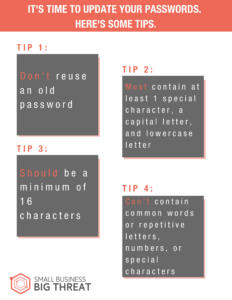So it’s time to update your passwords. Where do you start? Here’s some tips:
- Make sure you don’t reuse an old password
- Make sure it contains at least 1 special character, a capital letter, and lowercase letter
- It should be a minimum of 16 characters
- And it can’t contain common words or repetitive letters, numbers, or special characters
Here’s an example of what an insecure password may look like: Winter2021!
Here’s an example of what a secure password may look like: ZsWN7AzY0%o!BrdD
Passwords
Hate them or really hate them, passwords aren’t going away just yet. They may disappear one day, but until the new technologies become commonplace, we will continue to use passwords. So how can we make using passwords simpler for our everyday use while staying as ‘cybersecure’ as we can?
Password Creation
It is important to create unique passwords for every account you use. It is also important for these passwords to differ from each other so if one password is compromised the others won’t be. This becomes very difficult to do successfully the more passwords you have to remember. I really encourage small businesses, coworkers, and everyone who asks, to start using passphrases. Passphrases are simply that, a phrase. They tend to be longer than your typical password, which helps make them more secure, as long as you still add in upper and lower case letters, numbers, and special characters.
Here’s an example of a secure passphrase may look like: Cyber$ecurityIsAlwaysImportant247365Day$0fTheYear!
Password Generators
There are also tools out there that allow you to auto generate a randomized password. These are great to use because you will never need to think of a new password or passphrase again! In fact, recently both Microsoft Edge and Google Chrome have added password generators to their respective web browsers.
Password Searches
There are also tools out there that will check if the password you use or want to use has been associated with a known password exposure hack. One reputable tool to do so is from Have I Been Pwned. Their site also can check to see if any of your emails have been associated with data breaches.
Password Managers
Lastly, let’s talk about password managers. Password managers are usually a great way to save your passwords to your devices or in the cloud to easily access your passwords for quicker logins. The difference between using a password manager and using the notepad on your device is that password managers store your passwords in an encrypted vault, helping protect your passwords if your device is stolen, unlike most notepad apps on your devices. To see some of our top recommended password managers, check out our Cybersecurity Tools guide.
For more on passwords and other cybersecurity topics check out Small Business Big Threat!
